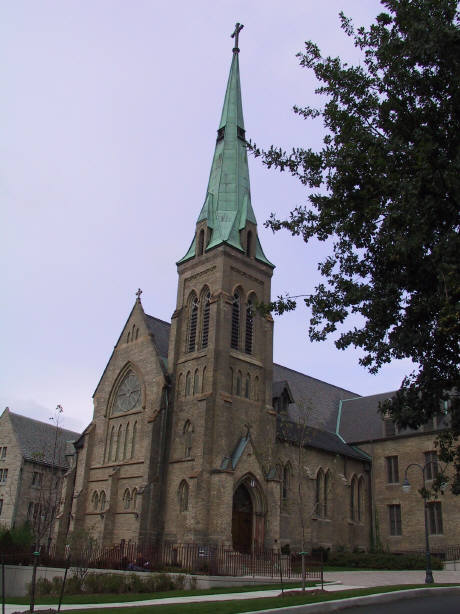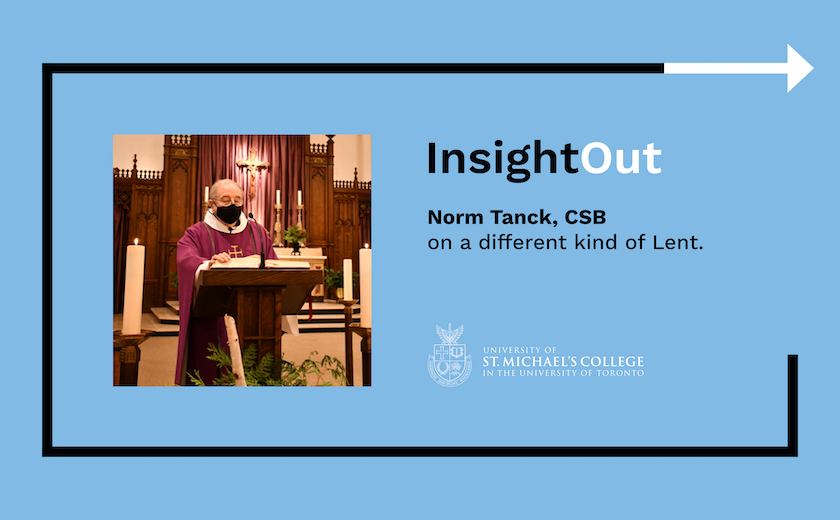Norm Tanck, CSB is the Associate Pastor of St. Basil’s Parish. He entered the Basilian Novitiate in Erindale, ON in 1967 and made his first profession of vows in 1967. He received his M.Div. from USMC in 1973 and was ordained a priest in 1974. Norm served as St. Mike’s Director of Campus Ministry and College Chaplain from 1982 to 1985.
A Different Kind of Lent

As I write this, I do not know what Ash Wednesday and Lent will look and feel like this year. St. Basil’s Parish has plans for when and how ashes will be distributed. We will have short continuous services during the day. If you are on campus, you can check St. Basil’s Parish website to see how you can register for a time to receive ashes (Information for Ash Wednesday). The way we receive them this year will be different. If you can come in person, they will not be smeared on your forehead as in the past, but sprinkled on the top of your head, as they do in Rome.
Every year in the past St. Basil’s Church would have overflow crowds of people coming to receive blessed ashes on their foreheads. Parishioners, members of the USMC community, local residents, government workers, businesspeople and shoppers would leave the church and go into the world around them bearing the Cross of Jesus Christ for all to see.
There may have been a sense of solidarity in the church, but on Bay Street, in Eataly, in the MacDonald Block, or Robarts Library, I imagine one could feel conspicuous, self-conscious, even vulnerable. Some, however, may have felt proud to profess their faith in such a public way.
There may be a sense of relief this Ash Wednesday that we might not have to face the stares and quizzical looks, maybe even the ridicule of others. We may not even have to face the challenge to look at our lives and assess what needs to change for us to live a good life in relationship to God, others, the rest of creation, and ourselves.
This kind of self-focus, self-assessment and call to personal conversion, transformation, and change is only part of what Ash Wednesday and Lent is about. Often, we forget or maybe ignore the call the is given to us, to the Church.
The first reading for our Ash Wednesday liturgy tells us: “…call a solemn assembly; gather the people. Sanctify the congregation; assemble the aged; gather the children, even infants at the breast” (Joel 2:15-16a). The people, a corporate reality, is called to change. The Lenten call to repentance is a call to the Church herself to change, and a warning to humanity that the path it is on will result in ruin. The prophet Joel uses the image of a famine to portray a people, a nation, in crisis. Joel is not one of the happiest books in the Bible. But I think he is a relevant prophet for us today.
Walter Bruggeman, a Scripture scholar who specialized in the Psalms and the Prophets, said that a prophet has three functions. The first is to announce that the old order is ended—not that it is going to end but that it is already over. The second function is to let the people sing their songs of lamentation, to grieve their loss. The third is to give the people a new hopeful and energizing vision for the future.
This year, as I reflect on what Ash Wednesday may mean as we begin the second year of our pandemic crisis, I am struck by this corporate call to repentance and change. It is a call that is given to the Church so that like Joel we can become a prophetic witness to the world. COVID-19, like Joel’s agricultural crisis, is emblematic of the cumulative issues and many crises that threaten the common good of the human family and of all of creation.
In his latest book reflecting on our present COVID-19 crisis, Pope Francis says, “Every now and then, however, great calamities awaken the memory of (our) original liberation and unity. Prophets who sought to recall the people to what really matters, to its first love, suddenly find eager audience. Times of tribulation offer the possibility that what oppresses the people – both internally and externally – can be overthrown, and a new age of freedom begin… Crisis has shown that our people are not subject to blind forces but in adversity are capable of acting” (Pope Francis, Let Us Dream: The Path to a Better Future. New York, Simon & Schuster).
The Pope uses a familiar model to reflect on the issues and respond effectively. We begin by seeing what is going on, being attentive to the situation. Then we must discern what needs to be done and choose a plan of action. And finally, we must do it.
This model is good for our personal Lenten discipline and conversion, but this year, it comes as a special challenge for the Church and our prophetic witness. What do we have to announce? How do we let go of the past? And what is our hope for the future, not only for ourselves but for the world in which we live?
Pope Francis in the epilogue of his recent book writes, “A crisis forces you (us) to move, but one can move without going anywhere. In lockdown many of us left the house for essentials or walk around the block to stretch our legs. But then when we get back to where we were and what we were before, like a tourist who goes to the sea or the mountains for a week of relaxation, but then returns to her suffocating routine. She has moved, but sideways, only to come back to where she started”.
He goes on to say, “I prefer the contrasting image of the pilgrim, who is one who decenters and so can transcend. She goes out from herself, opens herself to a new horizon, and when she comes home, she is no longer the same, and her home won’t be the same… This is a time for pilgrimages”.
This is a time for us to look, choose, and act.
Read other InsightOut posts.

